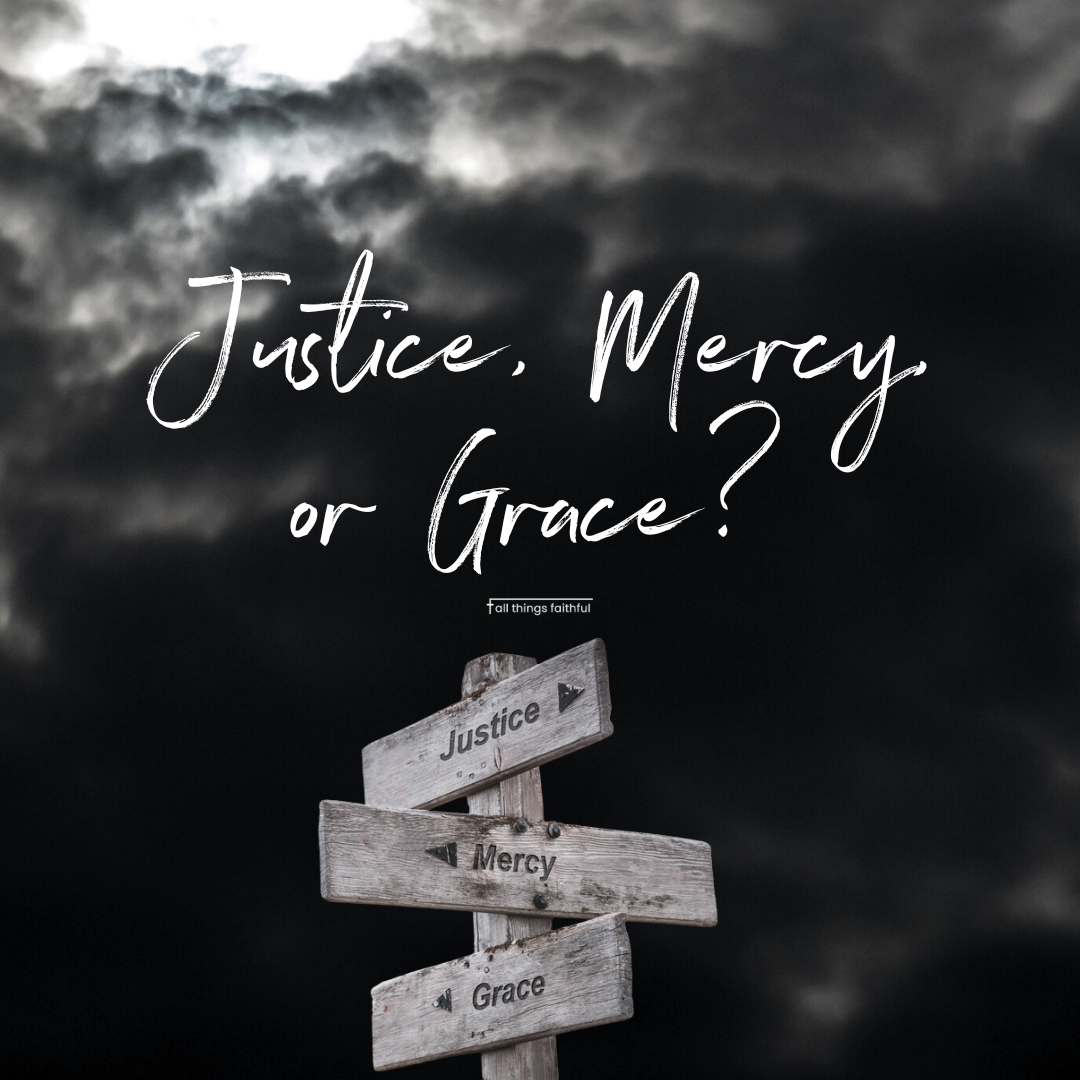
Justice, Mercy, or Grace?
For our sake he made him to be sin who knew no sin, so that in him we might become the righteousness of God.” 2 Corinthians 5:21 (ESV)
Have you ever wondered why a holy and righteous God could allow so many evil things to happen in the world? Cruelty, injustice, inhumanity … how can a loving God tolerate these things in His kingdom?
It’s a common question we often grapple with as Christians. We sometimes get challenged by non-believers and doubters who ask, “If your God really exists, why doesn’t He just destroy evil?” Or a more specific question: “So, if Satan and God are both real, why didn’t God just destroy Satan when he rebelled?”
These questions cut to the heart of our understanding of God’s nature, justice, and grace.
The Nature of God’s Justice and Grace
To understand questions like these, we must first look at the nature of God. Scripture tells us that God is both perfectly just and infinitely gracious.
In Deuteronomy 32:4, we read, “He is the Rock, His works are perfect, and all His ways are just. A faithful God who does no wrong, upright and just is He.”
The Apostle Paul reminds us in Ephesians 2:8-9 that “For it is by grace you have been saved, through faith—and this is not from yourselves, it is the gift of God—not by works, so that no one can boast.”
At first glance, these two attributes of God might seem contradictory. Justice demands that wrongdoing be punished, while grace offers unmerited favor. So why does God, who is capable of enacting perfect justice, choose to allow evil to exist, and why did He not destroy Satan and evil immediately?
The Gift of Free Will
The answer to this question is a profound gift from God: free will. God created each of us (including Satan and all the angels) with the ability to choose—to do good or to do evil.
This freedom is essential for love to be genuine. If we were created to do only good, our love and obedience to God would be meaningless. Joshua 24:15 emphasizes this choice: “But if serving the Lord seems undesirable to you, then choose for yourselves this day whom you will serve.”
Free will means the possibility of choosing evil must exist. Satan’s rebellion and mankind’s fall in the Garden of Eden (Genesis 3) illustrate the exercise of this free will. If God had destroyed Satan immediately after his rebellion, He would have been removing the very possibility for free will to work.
God’s Redemption Plan
On the other hand, there are some who cry out for justice without considering the possibility of grace. They demand that wrongdoing be punished harshly.
God has the power to carry out this punishment at any time. And by that standard, none of us could escape the punishment for our own. God’s perfect righteousness demands all sin be punished. Who of us could accept that judgment had God not given us a path to salvation?
Mercifully, God’s plan goes beyond merely allowing choice. It includes the wonderful opportunity redemption and forgiveness. In this way, the evil in the world, and even our own sins, can be turned to fulfilling God’s purpose.
Paul teaches in Romans 8:28 that “we know in all things God works for the good of those who love him, who have been called according to his purpose.” God allows evil to exist, not because He is powerless to stop it, but because He can use even the worst situations to bring about a greater good.
Consider the story of Joseph in the Old Testament. Joseph’s brothers sold him into slavery, an act of great evil. Yet, God used this situation to save many lives during a severe famine. Joseph himself recognized this when he said to his brothers in Genesis 50:20, “You intended to harm me, but God intended it for good to accomplish what is now being done, the saving of many lives.”
The Ultimate Display of God’s Righteousness
God’s allowance of Satan’s existence and the presence of evil also serve to ultimately display His righteousness and glory. Through Jesus Christ, God’s justice and grace come together through His compassion and mercy.
On the cross, Jesus took upon Himself the punishment for our sins, satisfying God’s justice. At the same time, His sacrifice offers us grace, the opportunity for redemption and eternal life.
Jesus’ victory over sin and death is the ultimate display of God’s righteousness and power, showing that even the greatest evil can be used to fulfill God’s divine purposes.
Our Future Hope
Ultimately, the existence of evil and suffering is temporary. Revelation 21:4 promises us a future where “He will wipe every tear from their eyes. There will be no more death or mourning or crying or pain, for the old order of things has passed away.”
God’s allows evil as part of a larger story that culminates in a new creation, free from sin and suffering.
While the presence of evil and the question of why God did not destroy Satan immediately can be challenging to understand, they are deeply connected to God’s gift of free will, His redemptive plan, and His ultimate display of righteousness.
God’s justice and mercy are in perfect balance with His grace, and His purposes, though sometimes beyond our understanding, are always for our ultimate good and His glory.
Let us trust in His wisdom and look forward with hope to the day when His perfect justice, mercy, and grace will be fully revealed.
May God continuously lead your path


